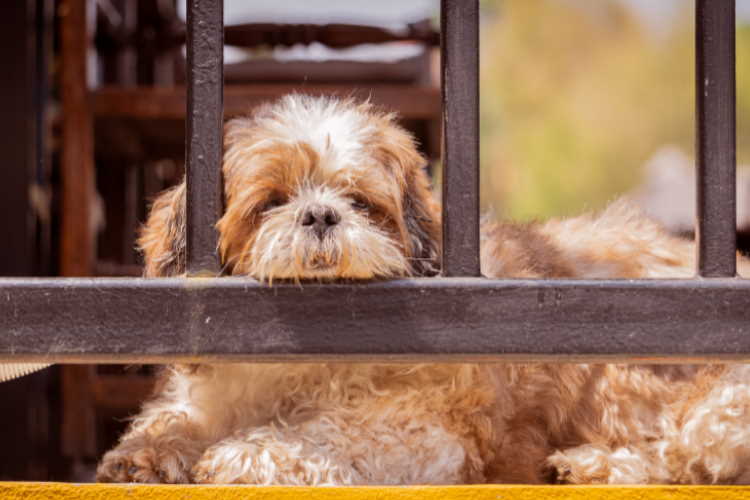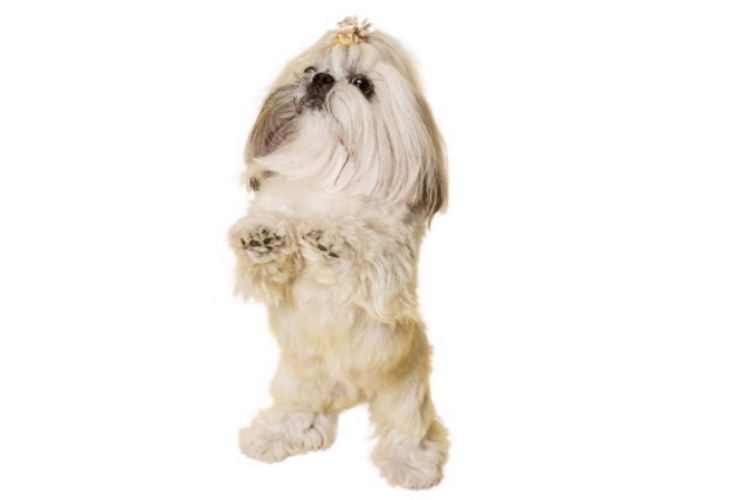Separation Anxiety in Shih Tzu
What Is Separation Anxiety In Dogs and Signs Your Dog May Have It
BY MOLLY | EVERYTHINGSHIHTZU.COM
Getting a new canine pal can be one of the best decisions you make. A dog offers companionship, unconditional love, and it can greatly improve your quality of life.
However, what do you do when your new pup can't stand to be away from your side for even a moment?
 Separation Anxiety in Shih Tzu
Separation Anxiety in Shih TzuThe 3 most important things you can do to help prevent separation anxiety in your dog is:
- Make sure she has had adequate exercise before you leave.
- When you need to go, don’t make a big deal about it, and try some music or an audiobook to provide some company.
- Train your pup to learn that you’ll always come back by going away for a few moments and gradually increasing the time that you are away.
Coming home to an excited, adoring pup is a great feeling; there’s just something about how warm and fuzzy it makes you feel.
However, coming home to chewed up slippers or furniture, or your trash strewn about the floor, is not so much fun.
If your dog suffers from separation anxiety these are the sort of things you can come home to, not to mention your dog is probably miserable, so it’s up to you to help your furry friend ease their stress.
What is Separation anxiety?
Separation anxiety in dogs can range anywhere from mild to severe.
When a dog is highly attached to its human, they can get very stressed out when left alone.
When they get stressed they act out in ways that can be very frustrating for the pet parent especially when they come home to chewed up shoes, furniture, broken dishes or scratch marks on the doors or windows.
Dogs can get bored and can get into quite a lot of mischief when they are by themselves, and yet we can puppy proof our homes to prepare for this.
But boredom is not the same as separation anxiety.
When a dog suffers from severe separation anxiety, these poor stressed out pups will often chew the legs of chairs, baseboards, tables, curtains or anything else they can get a hold of.
 Dogs with separation anxiety will watch you steadily
Dogs with separation anxiety will watch you steadilySymptoms of Separation anxiety in dogs
Other than coming home to a destroyed home, there are other ways dogs can exhibit separation anxiety.
Common signs your Shih Tzu may have separation anxiety include:
- Excessive barking, howling or whining
- Urinating or defecating in the house even though they are housetrained
- Pacing back and forth, or in circles and other patterns
- Follows you everywhere and won't let you out of their site
- Blocking the door so you can't leave the house
- Nipping, but not biting at your pant legs
- Very hyper, overly excited or jumping all over you when you come home
- Attempts of escaping out of confined areas, but this usually occurs when your not home
If you and your vet have ruled out any medical conditions that may be contributing to your dogs behavior, the next step is trying to help them overcome the anxiety when left alone.
How Can You Help Your Dog with Separation Anxiety?
Something that is important to remember is that dogs are pack animals by nature, and they are rarely left on their own.
The whole idea of a “lone wolf,” is not the norm.
Wild dogs are used to being with their packs, but with our domesticated pets, it is of course, different.
As humans, we have jobs to go to, errands to run, social activities that call us away from home, and so on, and many of these events don’t allow dogs.
Since you’re most likely not planning to become a hermit and never leave your house, your dog stays at home on his own when you need to go on your daily excursions.
If you don’t want to keep hearing from your neighbors about how your dog howled his head off all day again while you were at work, then it’s time to make some changes.
You can’t change your dog’s nature -- he instinctively wants to be with you, but you can help to ease the stress when you do need to leave home.
Some people might think, “Well, what if my dog is stressed out when I’m gone? I’m not there, and once I’m home, he’s fine!”
Well, if you’re a dog lover, then you probably don’t think this because you don’t want your dog to be unhappy.
Remember, separation anxiety is rough on your pooch, and it’s your responsibility to help her work through it.
 "Please don't leave me!"
"Please don't leave me!"There’s no need to let anxiety take over your life every time you need to bid adieu to your Shih Tzu.
All you need is a little patience and dedication, and these few simple tips, and soon your pup will be a more relaxed canine when you need to be apart.
Make sure your pup gets adequate exercise
A tired pup will have little energy for howling and chewing and other acts of mischief.
Before you leave, take your dog for a walk and have some playtime so that your dog can blow off some steam.
Plus, you want to make sure he’s had his potty break before you leave, too.
Shih Tzu don’t require a lot of exercise, but you still want to make the walk nice and brisk so that your pup gets in a good workout.
Afterward, provide praise and treats and plenty of fresh water, and then you can leave your Shih Tzu in a calm, resting state.
Start small and build up gradually
Take some time early on to engage in a little separation training with your dog.
Start by leaving your dog alone for a couple of minutes.
Be calm (remember dogs pick up on your feelings) and go out of the door, closing it behind you.
After a couple of minutes, return to your pup and reward him with a treat.
Do this a few times, then gradually increase the time you are away to five minutes, ten minutes, twenty minutes, etc.
Eventually, you can work up to an 8-hour day so that you can go to work without stressing out your pooch.
Don’t make it hard to say good-bye
Ask any teacher of young children for advice on bringing a crying toddler to school and you will hear a similar tip -- don’t make a big deal about saying good-bye, just go.
The majority of the time, the toddler will end her tears and be fine within seconds of her parent’s departure.
Although dogs are not exactly the same as toddlers, the same concept holds true -- making a big deal of saying good-bye is just going to make things more difficult.
You’re not going to hurt your dog’s feelings if you don’t say good-bye. When you need to leave, just remain calm and exit.
There is no need to talk to your dog or pet him before you go.
If your dog has very high separation anxiety, you may want to practice small bouts of not talking and not touching your dog while you are at home so your dog starts to learn that it is no big deal.
Give your pup something to do
Playing an audiobook or music while you are away can help keep your dog calm.
The sound can help soothe him, especially the sound of a human voice, plus it can help mask any ambient noises that might make your dog uncomfortable or get him excited.
You can also leave adequate stimulation activities for your pup like a chew toy, treat puzzle box, or even a blanket or plush animal that has your scent on it.
These items can help to soothe your dog and make her feel more at ease.
They can also help keep boredom at bay and offer a distraction for your pup.
Turn to the experts
If you’re struggling with how to help ease your pup’s anxiety, and you just can’t seem to make it better, then talk to your vet.
Your vet knows your dog, and she can give you some more personalized recommendations that you can try to help make your Shih Tzu feel more at ease during the times that you are away.
Alternatives that may help Your Dog with Separation Anxiety
You may have to think outside the box when it comes to separation anxiety.
So in addition to using the above steps in helping your dog overcome their stress from being separated from you, one of the following alternatives may make the process even easier:
- Take your dog to work with you
In a perfect world, our employees would see the benefit of well-behaved dogs in the work place, but unfortunately it isn't always practical.
If you are in a position to take your dog to work, this would be a wonderful opportunity for both you and your dog.
- Family and friends
Ask a family member, friends, or even dog sitters to come to your home to keep your dog company when you can't be there. You pup will feel more comfortable in surroundings she knows well.
- Doggy daycare
The business of daycare for pets has become so popular these days, so if you don't mind paying for it this could be a great way for your dog to overcome anxiety of being away from you, as well as teaching him social skills with other dogs and humans.
- Give them a space of their own
This is where a crate can come in handy. If you've done crate training right, then your dog will know this crate is a safe place.
However, keep in mind in some dogs crating them can cause additional stress and anxiety, so watch for signs of distress (panting, drooling, frantic behavior, persistent howling and or barking.)
Some people may find using a pet camera useful in helping their dog overcome separation anxiety. This may or may not help in your particular situation, yet at the minimum you'll be able to see what they do when you're away from home and learn their habits.
With a little effort and patience, your dog can learn that it’s okay to be alone.
Don’t let your pup’s separation anxiety stress you out, that will only make it worse.
Be understanding of why your dog feels the way he does, and implement these tips so that your pup can be calmer and happier when he needs to play solo for a while.
You’ll find that in time, it gets easier when you need to be away from your pal, and your dog will adjust.



